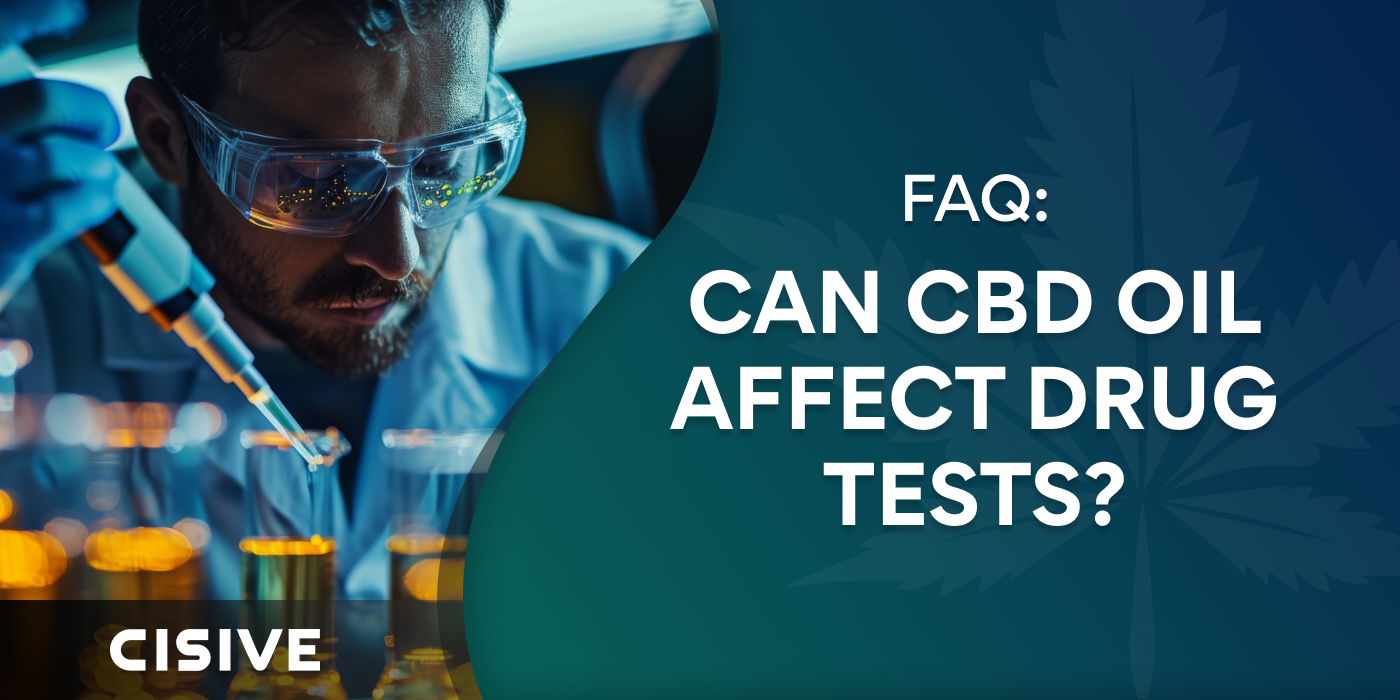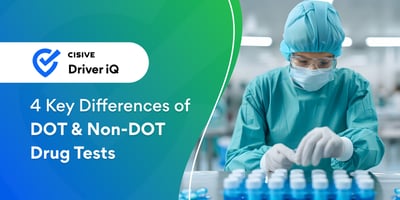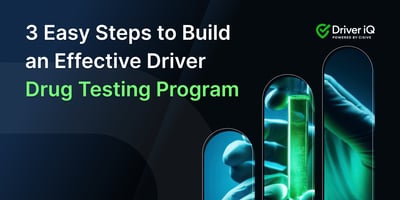

No matter how many employees you have, you're responsible for keeping them safe. Employers also...

Many people use CBD to manage problems such as pain, inflammation, and anxiety. With the rise of CBD products, HR professionals and hiring managers have raised concerns about the impact of CBD oil on drug tests.
If there’s one product that’s taken over the wellness sphere, it’s CBD oil. In 2020, as many as one in three adults reported using CBD oil, with several consumers claiming the product helped them with inflammation, pain, and anxiety.
Unlike THC, CBD doesn’t have any psychoactive effects, which means consumers remain sober. However, CBD can still potentially impact a drug test.
CBD oil itself doesn't affect drug test results, but not all CBD products are THC-free. This means they can trigger positive results during marijuana testing.
If you help manage a workplace, you know how important a drug-free environment is. Accurate, reliable testing can help detect THC use and give employees insight into what they’re ingesting. In this article, we’ll take a closer look at the role of CBD oil on drug tests and how to promote a safe, secure workplace.
Key Takeaways
|

CBD (cannabidiol) is a natural extract derived from the cannabis plant. Unlike its well-known counterpart, tetrahydrocannabinol (THC), CBD is not psychoactive or intoxicating. In other words, it does not produce the “high” commonly associated with marijuana.
Rather, CBD is known for its therapeutic benefits. It works by interacting with the body’s endocannabinoid system, which regulates processes such as mood, pain, appetite, and sleep.
CBD oil has gained popularity for its supposed medicinal benefits. Many consumers claim CBD has helped them relieve pain, stress, and inflammation. It's generally available as an oil but comes in various other forms, including tinctures, capsules, topical creams, and edibles.
Certain CBD products are approved by the U.S. Food and Drug Administration (FDA) for specific medical conditions, such as epilepsy. This includes Epidiolex, a prescription oil approved to treat two types of epilepsy. However, most CBD products are not regulated.
The majority of CBD products are sold over the counter as “dietary supplements.” Because the CBD industry lacks regulation and testing standards, there are many concerns about product quality, consistency, and labeling accuracy.
For example, unregulated CBD products carry the risk of extra, unwanted ingredients (such as THC). Some researchers have also argued the health benefits of over-the-counter CBD products are minimal.
Recommended Reading: Non-DOT Drug Testing

The primary difference between CBD and THC is their psychoactive effects. THC causes intoxication, while CBD does not.
THC and CBD are often compared because they’re both cannabinoids and are derived from the cannabis plant. When ingested, they bind to cannabinoid receptors (CB1 and CB2 receptors) found in the brain. However, that’s where the similarities end.
THC, which is generally associated with marijuana, is a psychotropic chemical. This means it causes a “high” or euphoric sensation. It impacts parts of the brain associated with behavior, learning, and memory to achieve this effect.
CBD, meanwhile, does not cause any psychoactive effects. As mentioned earlier, it interacts with the body’s endocannabinoid system and is typically used to manage pain, inflammation, and stress.
It’s important to note that CBD is only non-psychoactive in its purest form. Unfortunately, many unregulated CBD products contain trace amounts of THC.
In one study, 84 CBD products were examined for purity. About 25% of the products contained less CBD than advertised, while 18 featured small amounts of THC.
In many cases, oversights occur in the CBD industry due to the lack of regulations. For example, CBD products can become contaminated with THC during the extraction process.
Mislabeling is also a common problem, with some untrustworthy brands failing to test their products properly or intentionally mislabeling them.
When taken unknowingly, THC can cause a variety of adverse effects a consumer may be unprepared to handle. For example, it can impair judgment, behavior, and mobility, all of which pose risks in the workplace.

Cannabis drug testing detects the presence of THC in biological samples, such as urine, blood, saliva, or hair. Employers often use workplace drug testing to screen job applicants or monitor employees for substance use.
While any job can require drug screening, it’s especially common in industries with high safety or performance concerns, such as healthcare, government, construction, and automotive settings.
The U.S. Department of Transportation has its own type of drug testing, known as DOT testing. It’s used for certain professions, such as pilots, truck drivers, and train conductors.
Other employers use non-DOT tests, which gives them more discretion over what drugs to test for and where to perform testing. Here’s a brief overview of how the drug testing process works:
When conducting cannabis drug testing, it’s extremely important to use a reliable, high-quality source. Reliable testing helps maintain a safe workplace environment and ensures all test results are accurate. If an employee is fired or punished for inaccurate testing, the workplace becomes open to a lawsuit.
Accurate drug testing can also give employees deeper insight into what they’re consuming. For example, say someone is unaware their CBD oil products contain THC. Drug testing can reveal what’s actually in their products.
At Cisive, we protect both employees and employers through expert drug screening services. We streamline drug testing to make the process as seamless as possible while also promoting accuracy and confidentiality.
Recommended Reading: Chain of Custody Forms in Drug Testing

A positive THC result can be triggered by amounts as small as 50 nanograms per milliliter (ng/mL). For reference, a nanogram is one billionth of a gram. So, if you consume any amount of marijuana or THC, it’s likely to appear on a drug test.
A common concern among HR professionals and employees is, “Does CBD oil show up on drug tests?” Generally, CBD should not cause a positive drug test result. Cannabis drug tests look for delta-9-THC, which is not found in pure CBD products. That being said, you can receive a positive test result if your CBD oil has trace amounts of THC.
Many commercial CBD products are not FDA-approved, so they’re not subject to high quality control, safety, or testing standards.
It’s relatively common for delta-9-THC products to be mislabeled and sold as CBD. According to a 2017 study conducted by Penn Medicine, as many as 70% of over-the-counter CBD products were mislabeled.
Misleading or inaccurate labeling can be dangerous to customers. For starters, it can cause unexpected, adverse effects, such as impaired judgment and mobility. It may also lead to unintended drug interactions for consumers who are on certain medications.
Mislabeled products also have the potential to harm others. For example, if an employee’s judgment is impaired, it can affect their ability to safely execute their job. Contaminated products might also cause a positive drug result, which threatens employment.
Recommended Reading: First Advantage vs. Hireright
CBD oil itself will not cause a false positive on a cannabis drug test. However, if the CBD oil has trace amounts of THC, it may trigger a positive result.
Typically, THC winds up in CBD products due to cross-contamination or mislabeling. If a person is unaware of CBD contamination, they may believe their result is incorrect.
Ultimately, if a marijuana drug test result comes back positive, it means the person likely has THC in their system. This can pose a threat to employers and workplace safety, regardless of where that THC came from. In other words, even THC from CBD oil can compromise safety.
Warning employees about the possibility of contamination reduces the risk of positive test results. It’s also helpful to use highly accurate testing methods, which lowers the likelihood of false positives in general.
One of the best ways to ensure drug tests are accurate and reliable is by working with a trusted provider, such as Cisive. Our reliable drug and occupational health screening solutions offer high rates of accuracy, ensuring you maintain a safe, compliant workplace.
Many people consume CBD oil to reduce pain, anxiety, and stress. While CBD itself does not cause psychoactive effects or a euphoric “high," many over-the-counter products are contaminated with THC or intentionally mislabeled.
As a consequence, it’s possible to consume THC without realizing it. To avoid inadvertently consuming THC, consumers may want to avoid CBD products altogether. If a consumer does want to use CBD, it’s helpful to conduct thorough research and find reliable sources, such as companies that perform third-party product testing.
Employers should also take steps to ensure their workplace environments are safe and compliant through regular drug screenings. For many industries, such as healthcare and construction, maintaining a sober environment is key to guaranteeing the safety of employees and customers.
It’s important to get accurate results when conducting a drug test. False positives damage credibility and negatively impact employees. Partnering with a trusted screening provider, such as Cisive, protects your work environment and everyone in it.
Want to learn more about our streamlined drug testing? Connect with an expert today.
Author: Jessica McDonald
Bio: Product Strategy and Development, Drug Testing and Occupational Health Subject Matter Expert at Cisive
Let's Connect on LinkedIn
No matter how many employees you have, you're responsible for keeping them safe. Employers also...

Motor carriers need to hire drivers who are safe and reliable, both for the public’s safety and...
%20-%20Blog%20Post-1.png?height=200&name=BLOG_%20Understanding%20DOT%E2%80%99s%20Preemployment%20Drug%20Testing%20Requirements%20(Refreshed)%20-%20Blog%20Post-1.png)
The Department of Transportation (DOT) has hundreds of regulations designed to keep motorists,...